RV Types: Choosing the Right RV Classification for Your Needs
RVs come in all shapes and sizes- from tiny teardrop trailers to massive luxury motorhomes. With so many different types of RVs on the market, it can take time to decide which one is right for you. Here's a quick guide to help you choose the right RV classification for your needs.
If you prefer to learn each RV type directly, click the model below and you will be taken to the related content immediately.
Outlining your needs
Shopping for an RV can seem overwhelming with the different classes and models. To ensure you purchase the best RV for your lifestyle, it helps to consider exactly how you plan to use it. If you like traveling across the country, then a Class A motorhome would be best for long trips since it offers the most space and features out of all classes of RVs.
However, suppose you prefer shorter exploration trips or staycations close to home. In that case, a smaller option, such as a pop-up or travel trailer, might work better since it's easier to maneuver and less expensive. Ultimately, there are different types of RVs available, and defining what you need starts with understanding your unique needs, interests, and preferences.
Sizing the RV
With the explosion of RV types on the market, it can be a daunting task to decide which RV is best for the size of your family. Choosing the wrong RV size could lead to a cramped and uncomfortable journey, so it is essential to consider the number of people using it. When selecting an RV according to the size of the group you are traveling with, make sure there are enough sleeping arrangements available and enough space for each person to move around comfortably.
Licenses required for each type of RVs
RVs, both motorhomes and towables, can be pretty large. It's a common misconception that you need a special license to drive one of them down the road. In reality, when it comes to driving or pulling a recreational vehicle in the US, you will rarely need a specialized driving license*.
A few states have placed provisions on some Class A RVs, but it varies from state to state. A somewhat common rule (with Class A) is if it weighs less than 26,000 pounds and is 40 feet or shorter in length, you can drive with your regular driver's license. If these requirements are exceeded, however, you may need to take a specialized RV safety course or obtain an official Commercial Driver's License (CDL) to cruise safely on the road.
*Taking an RV safety course is still highly recommended
Class A Motorhome
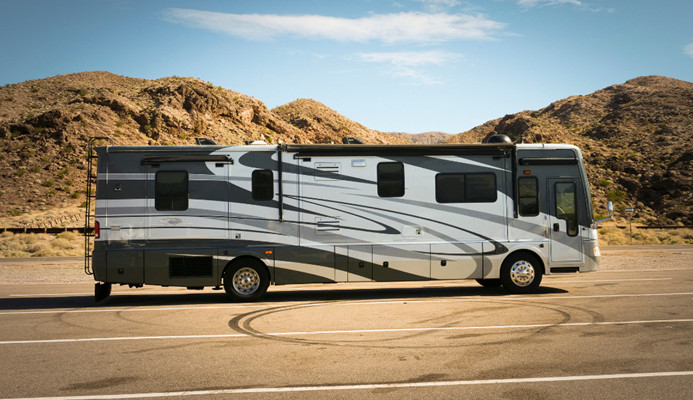
Image courtesy: RV Industry Association Staff
Class A motorhomes offer a travel experience unlike anything else. These are the ones that most people picture when they think about a motorhome. They use them in so many of our favorite movies like Christmas Vacation with Chevy Chase.
Class A motorhomes combine a specially designed chassis with a large, integrated coach. Think tour bus or even a Greyhound bus. They are generally powered by a diesel engine, though there are a few gasoline engines available. This motorhome class is found in lengths ranging from 21 feet to 45 feet and easily hits 30,000lbs. They also have the higher price tag on this list that will set you back a solid $100k to upwards of $1 million.
They are the largest class in recreational vehicles and are often the most luxurious. These coaches can be loaded with everything from marble countertops to teak cabinets and full luxury showers. They also accommodate popouts/slide-outs that can nearly double your interior floor space when you're parked for the night.
These rigs frequently come with the option of an onboard generator. Those tend to be noisy and smelly and require some fossil fuel. While you're trying to relax, the vibrations from a generator can be a real mood-killer. Luckily, we have many options to replace the generator with a full solar setup that will have you enjoying your days in perfect, beautiful silence. We also have a lot of helpful articles on our site designed to help walk you through the solar system process.
Class B motorhome
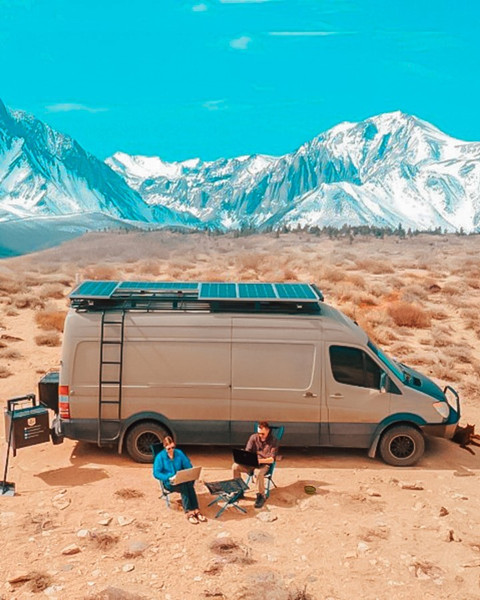
Class B motorhomes are extremely popular right now. When you see a van conversion driving down the road with kayaks strapped to the top, that's a Class B motorhome, this class is a favorite for fuel efficiency and driveability. Mostly, it will feel like driving a regular van down the road. The difference is that you will have your bed and everything else with you.
This type of recreational vehicle is a good balance between convenience and luxury, meaning it's superior to classes A and C in many respects. With a Class B RV, road trips become a world of their own and can make all sorts of destinations accessible with little stress or effort involved.
These smaller RVs tend to be able to go more places, too, thanks to their narrow size and taller ground clearance. A downside is that you can't get a popout with these, which can make them feel pretty tight inside. If you have more than two of you, these are not going to be the way to go. Some of them even don't have bathrooms, or at the least, have tiny wet bathrooms where the toilet and shower are in the same compartment.
This class typically fits the 17-20ft length and will run anywhere from $40k to $200k if you get a custom build-out.
One of the many reasons for the surge in popularity of Class B RVs is that people can do conversions themselves, which is fun and can save you a lot of money. There's a serious industry now built around supplying parts, equipment, and modifications for the DIY crowd.
At Renogy, we are the leader in Solar Energy solutions for Class B and van conversions. Our team has carefully compiled guides for many situations covering everything from planning to wiring diagrams to complete parts lists. We also offer solar kits to make it even easier.
Class B+ Motorhomes
This is a relatively new classification. They're slightly bigger than the standard Class B and slightly smaller than the Class C. One of the benefits is they can be outfitted with popouts, so even though they're around the same length as a Class B, they can have significantly more floorspace inside when parked. The short wheelbase still maintains the maneuverability of its little sibling.
You'll generally find them running between 20-30ft in length. They'll cost you around the same as Class B, generally less if you compare it to a custom build on Class B.
They oftentimes come prewired for solar systems to help maintain their batteries or even make them capable of running off-grid. Even if you buy one with a small solar system installed already, just large enough to keep the battery charged in storage, Renogy can help you upgrade the system to handle anything you can throw at it.
Class C Motorhomes
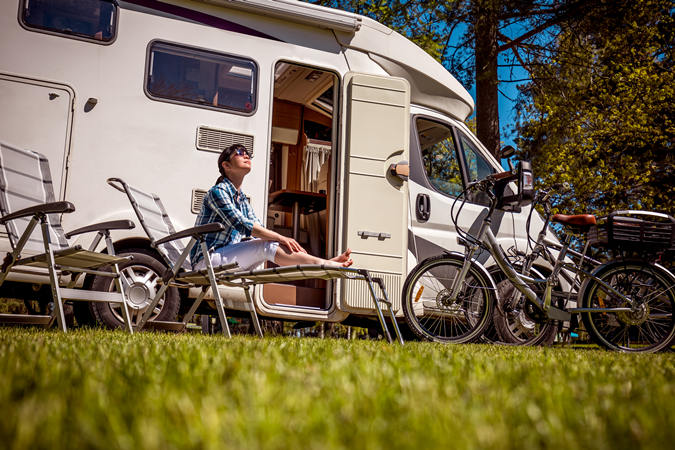
Class C motorhomes are a great option for travelers looking for something bigger than the traditional van-style Class B and smaller than a full-sized Class A RV. These are referred to as cut-away chassis. The manufacturer buys a chassis with a cab, like a rental moving truck but without the big box you stash all of your belongings in. They then build their coach to fit the cut-away chassis.
Class C motorhomes are easy to maneuver and make up a significant portion of the recreational vehicle market, with many types available. These types are based on cab chassis like Freightliner, Ford, and Ram. Each type is usually offered with different floorplans and lengths to suit the needs of its owner. With so much variety, there is no wonder why Class C motorhomes are becoming increasingly popular when it comes to the RV lifestyle!
Towable RVs
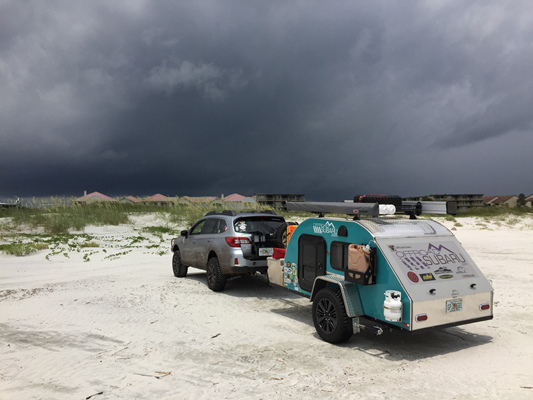
There are two main types of towable-type RVs. One is the travel trailer, often referred to as a "bumper-pull." The other is the fifth wheel. There are many smaller classifications that we don't have the space to get into here, like teardrops, micros, toy-haulers, etc.
Fifth wheels
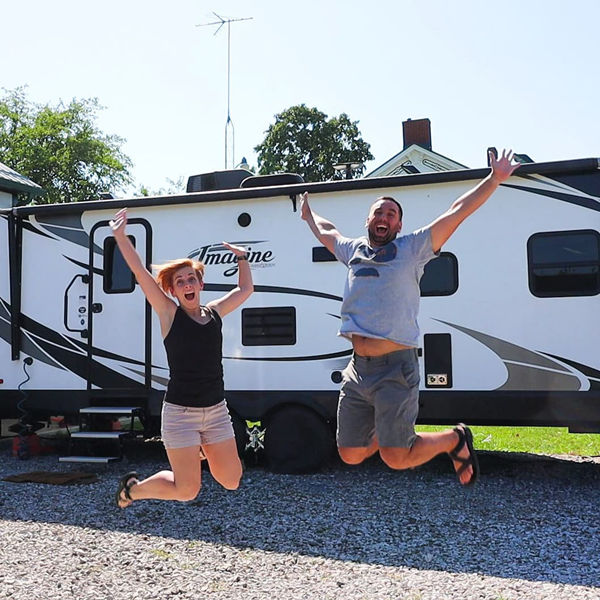
Mike and Steph in front of their 2018 Grand Design Imagine 2600RB
This towable is called a fifth wheel because of the round shape of the hitch mounted in the back of the tow vehicle that acts as a fifth-wheel. Fift-wheels have a lot of advantages and some disadvantages over other RVs. An advantage of this is that since you have a tow vehicle you can detach from the RV. You don't need another vehicle to make sure you can travel away from your RV. A disadvantage is that you need to buy a fifth wheel, which can range from $45k to $250K depending on features and size, as well as a pickup large enough to pull it. That can be another $50-$100k.
Fifth-wheels are hands-down the number one way for RVs to live on the road. Some people view buying a tow vehicle and a fifth wheel customized to what they want as more cost-effective than buying a large Class A.
Just like with Class A, you can design a fifth wheel to be as luxurious as you want, with many popouts and even dishwashers and full-size washers/dryers.
The fifth wheel chassis design makes these towables extremely stable in most circumstances. Far more than a travel trailer, which puts the weight on the back (behind the rear wheels) of the tow vehicle, as opposed to over the rear wheels. The stability difference is impressive and I would recommend anyone that who wants to pull a large coach or even a smaller one on long trips should strongly consider a fifth wheel.
Fifth wheels are a perfect choice to go off-grid with. The solar technology that is available nowadays can easily handle everything that your RV can need.
Bumper-Pulls
We've all seen this type of RV. It's the most common starting RV for most people as they tend to be cost-effective and have lighter weights, so you can tow them with more things.
As far as towing differences, refer to the fifth wheel section above.
Just like with the fifth wheels, these can be outfitted with a perfect solar setup to run the appliances and keep you away from smelly, noisy generators. Oftentimes, a smaller portable solar panel setup is plenty for a travel trailer.
Conclusion
Now that you know a little more about the different types of RVs available, as well as some things to consider before making your purchase, you're one step closer to hitting the open road! And once you have your RV, don't forget to outfit it with monocrystalline solar panels from Renogy. We have everything you need to get started using solar power on your travels, so check out our products today and start planning your next adventure.
Related articles:
How Long Does It Take To Install Solar Panels: 2023 Guide
How Many KWh Does A House Use Per Day: Ultimate Guide
Important Things You Should Know When Buying A House With Solar Panels
Best Battery For Trolling Motor
Are Lithium Ion Batteries Dangerous And What Are The Safest Lithium Batteries?








